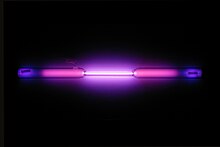ආගන්
Appearance
 | ||||||
| Argon | ||||||
|---|---|---|---|---|---|---|
| Appearance | colorless gas exhibiting a lilac/violet glow when placed in an electric field | |||||
| Standard atomic weight Ar°(Ar) | ||||||
| Argon in the periodic table | ||||||
| ||||||
| Group | group 18 (noble gases) | |||||
| Period | period 3 | |||||
| Block | p-block | |||||
| Electron configuration | [Ne] 3s2 3p6 | |||||
| Electrons per shell | 2, 8, 8 | |||||
| Physical properties | ||||||
| Phase at STP | gas | |||||
| Melting point | 83.81 K (−189.34 °C, −308.81 °F) | |||||
| Boiling point | 87.302 K (−185.848 °C, −302.526 °F) | |||||
| Density (at STP) | 1.784 g/L | |||||
| when liquid (at b.p.) | 1.3954 g/cm3 | |||||
| Triple point | 83.8058 K, 68.89 kPa[1] | |||||
| Critical point | 150.687 K, 4.863 MPa[1] | |||||
| Heat of fusion | 1.18 kJ/mol | |||||
| Heat of vaporization | 6.53 kJ/mol | |||||
| Molar heat capacity | 20.85[2] J/(mol·K) | |||||
| Vapor pressureසැකිල්ල:Center block | ||||||
| Atomic properties | ||||||
| Oxidation states | 0 | |||||
| Electronegativity | Pauling scale: no data | |||||
| Ionization energies |
| |||||
| Covalent radius | 106±10 pm | |||||
| Van der Waals radius | 188 pm | |||||
| Other properties | ||||||
| Natural occurrence | primordial | |||||
| Crystal structure | face-centered cubic (fcc) | |||||
| Thermal conductivity | 17.72×10−3 W/(m⋅K) | |||||
| Magnetic ordering | diamagnetic[3] | |||||
| Molar magnetic susceptibility | −19.6×10−6 cm3/mol[4] | |||||
| Speed of sound | 323 m/s (gas, at 27 °C) | |||||
| CAS Number | 7440-37-1 | |||||
| History | ||||||
| Discovery and first isolation | Lord Rayleigh and William Ramsay (1894) | |||||
| Isotopes of argon | ||||||
| Template:infobox argon isotopes does not exist | ||||||
ආගන් යනු පරමාණුක ක්රමාංකය 18 වූ මූලද්රව්යයයි. එහි රසායනික සංකේතය Ar ය. ආගන් ඒක පරමාණුක වායුවකි. ආවර්තිතා වගුවේ VIII / 0 (8) කාණ්ඩයේ සිටී. ආගන් උච්ච වායුවකි. ආගන් හි ඉලෙට්රොනික වින්යාසය 2,8,8 වේ. ආවර්තය 3 වන අතර කාන්ඩය VIII / 0 වේ. අයනය නොසාදයි. ප්රධාන සංයුජතාව 0 වේ.
මූලාශ්ර
[සංස්කරණය]- ^ a b සැකිල්ල:RubberBible92nd
- ^ Shuen-Chen Hwang, Robert D. Lein, Daniel A. Morgan (2005). "Noble Gases". Kirk Othmer Encyclopedia of Chemical Technology. Wiley. pp. 343–383. doi:10.1002/0471238961.0701190508230114.a01.
- ^ Magnetic susceptibility of the elements and inorganic compounds, in Lide, D. R., ed. (2005), CRC Handbook of Chemistry and Physics (86th ed.), Boca Raton (FL): CRC Press,
- ^ Weast, Robert (1984). CRC, Handbook of Chemistry and Physics. Boca Raton, Florida: Chemical Rubber Company Publishing. pp. E110. ISBN 0-8493-0464-4.

